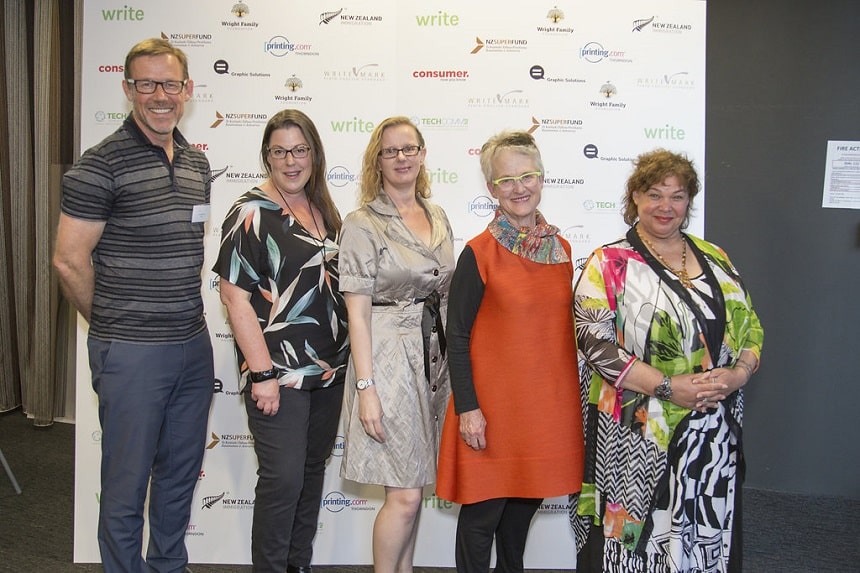
They're the sparkle on the plain English cupcake. Well done to this year's finalists. Photo by Audrey Fretz on Unsplash
Our judges have announced this year’s finalists. Find out who they are here
What makes an entry good enough to become a finalist? According to our judges, it’s all about being like this:
- ‘Overall, we have a strong example of how a company can take complex information and share the details both with clarity and with compelling storytelling. Kudos!’
- ‘I would certainly use this product as an example of effective plain writing and information design.’
- ‘This is an exemplary document.’
Now the countdown begins to our Awards ceremony on Thursday, 15 November, where we’ll announce and celebrate this year’s winners. Watch this space for details about how to get tickets.
Melissa Mebus October 18th, 2018
Posted In: 2018 Plain English Awards, Finalists, Plain English Awards
Tags: 2018 finalists, 2018 Plain English Awards, Industry awards, People's Choice

Deciding on our shortlists was no mean feat. Photo by Cathryn Lavery on Unsplash.
From what we’ve heard from our judges, finalising this year’s shortlists has been no mean feat. We received many outstanding entries from across both the public and private sectors. We’re thrilled to announce which of those entries made our shortlists.
Take a look at our 2018 shortlists
We’ll make our next big announcement — this year’s finalists — some time around 19 October. Watch this space!
Melissa Mebus September 20th, 2018
Posted In: 2018 Plain English Awards, Judges, Shortlists
Tags: 2018 Plain English Awards, 2018 shortlists, clear communication, Industry awards

We'll let our 'shortlist' cats out of the basket tomorrow, Thursday, 20 September. Image by Eric Han. Unsplash licence.
Over the past 2 weeks our judges have been busy reviewing all of this year’s entries. We’ll let the first ‘shortlist’ cats out of the bag (or basket) tomorrow, so watch this space.
In the meantime we can let you in on some of the feedback we’ve had about this year’s entries. Here’s what one judge told us:
I’m pleased to report we have many excellent entries (quality lifts every year, which is fabulous) and it’s tricky coming up with a shortlist.
Melissa Mebus September 19th, 2018
Posted In: 2018 Plain English Awards, Plain English Awards, Shortlists
Tags: 2018 Plain English Awards, 2018 shortlists, Champion

We were lucky enough to have five judges make last year's Awards ceremony. From left are Simon Hertnon, Kylie McGrath, Rachael Fogarty, Rachel McApline, and Maryland Spencer. Image by A Beautiful Photo
Meet our incredible line-up of plain English experts — from around New Zealand and the world — who’ll be judging entries in this year’s Awards. We’re proud to have such a wonderful pool of experts, and honoured that they’ve all offered their time to help us decide on our finalists and winners. We’re also grateful for the feedback they’ll give to all shortlisted entrants.
Judges for the 2018 Plain English Awards
Melissa Mebus September 3rd, 2018
Posted In: 2018 Plain English Awards, Communications, Judges, People's Choice awards, Plain English Awards
Tags: 2018 Plain English Awards, champions, clear communication, People's Choice, Plain English Awards

You now have 3 whole days more to submit your entries!
Entries for the 2018 Plain English Awards now close at midnight next Monday, 3 September. That means you’ve got 3 extra days to create your winning entry!
Read about our categories
See who won at last year’s Awards
Melissa Mebus August 30th, 2018
Posted In: 2018 Plain English Awards, Industry awards, People's Choice awards, Winners
Tags: 2018 Plain English Awards, clear communication, entry, Industry awards

Taking a fresh approach to legal writing with the Best Plain English Legal Document
Legal documents are changing. Once densely written, peppered with Latin, and strictly formatted, today’s legal documents are much more reader-friendly.
We’re all readers of legal documents. And we all appreciate clearly written documents that state the necessary information without resorting to legalese. Preferably, we want to be able to read the document and understand it easily. This means we can discuss the content with our legal advisor or a colleague, without having to rely on someone else to explain it first.
A fresh approach to legal
When we’re signing a contract, entering an agreement, or deciding who we’ll leave our worldly goods to, legal documents in plain English make each party’s obligations clear.
The Best Plain English Legal Document award recognises this fresh approach to legal documents. The judges will be looking for examples of legal writing that consider the reader’s needs rather than the writer’s. These are the documents that clearly and succinctly explain, streamline, and structure legal content that could otherwise be confusing to a non-legally-trained person.
Here’s what the judges praised in last year’s winner and finalist entries.
About the Contract and Commercial Law Act 2017 (Parliamentary Counsel Office)
Parliamentary Counsel Office did a great job of combining multiple Acts that were a confusing hodgepodge of legislation into a single intelligible Act.
A clear understanding of the audience and consultation with these groups made the project stronger. The explanations in the legislation were particularly useful.
The revised Act is a great step forward in New Zealand for plain English legislation. And the intended audience has a much clearer picture of contractual law in New Zealand.
About the Property Sharing Agreement (Cavell Leitch)
Cavell Leitch has shown a commitment to improving the clarity of a consumer-focused contract. Significant steps have been taken to improve the language.
The judges are looking forward to seeing what this year’s entries will bring.
Enter your fresh legal document here
Anne-Marie Chisnall August 29th, 2018
Posted In: 2018 Plain English Awards, Legal writing
Tags: Best Legal Document, clarity, Legal writing, legalese, recognition

Put your compelling annual report into the limelight
Have you joined the wave of change? Does your annual report tick off all the statutory stipulations and hum with life? Does it tell a compelling story of what matters to you and your stakeholders? Is it clear and concise?
If you’re twitching with pride right now, jump up and give your report the razzle dazzle it deserves.
Enter this year’s Plain English Awards and your report can leap into the limelight and take a bow. Entries close at midnight on Monday, 3 September 2018.
Fabulous feedback is waiting in the wings
Imagine you and your report basking in this kind of feedback. Here’s what the judges had to say about last year’s winners:
Overall, this is a great example of how you can appease regulatory requirements and appeal to a general reader — a true plain English experience with the audience in mind. Well done!
Great use of visual storytelling and pared-down messaging. The colours are vibrant and engaging.
This report has very little jargon, which is always great to see. The vocabulary is straightforward and clear.
More than just compliance
Gone are the days of an impenetrable collection of numbers and words, prepared for compliance purposes. Shareholders and stakeholders have switched their attention to companies with timely and relevant information shared in a compelling way.
Is this you? If it is, enter this year’s awards today — you need the fabulous feedback, and the world needs excellent examples.
Here’s what winners Z Energy said last year:
We knew making the report highly readable would help readers connect with what Z has achieved and its vision for the future.
A winning report is clear, easy to read, timely, and relevant
Judges will focus on the body of the report and will be checking that:
- all readers (not just the financial wizards) will find it easy to read and use
- readers can use the report to make useful decisions and comparisons.
What makes a clear annual report?
If your report has these elements, the judges will give it the thumbs up.
- Main messages that are clear and obvious
- Clear, concise and jargon free
- Technical terms explained
- Figures presented in an easy-to-understand format
- Graphs, tables and photos that support main messages.
Enter your report for the 2018 Plain English Awards.
Meet last year’s winners
Jayne Dalmer August 29th, 2018
Posted In: 2018 Plain English Awards
Tags: 2018 Plain English Awards, annual report, benchmark, plain English, recognition, stakeholders

It only takes a sentence to enter the Awards! Get transforming, using these simple steps.
Have you ever wondered what it would be like to enter an awards competition? The award for Best Plain English Sentence Transformation makes entering the Plain English Awards as simple as 1 – 2 – 3!
1. First, catch your sentence
Complex, long-winded sentences abound in official publications, on business websites, and around the office.
To find a suitable sentence, first of all, track down something that’s really long with multiple clauses, that maybe even includes more than one main idea, and also uses unnecessary, surplus words and phrases and convoluted language, which nevertheless might be regarded by some as adding a certain element of essential formality. See what we did there?
2. Rewrite your sentence in plain English
Rewrite your sentence in plain English so that it becomes simple and beautifully crafted. Keep your sentence short. If needed, you can use more than one sentence to express the ideas of your original text.
3. Enter your sentence in the award for Best Plain English Sentence Transformation
Enter your original and rewrite in the category that gives well-written sentences the attention they deserve. You can enter up to three sentence transformations in one entry. And feel free to enter more than once!
Enter the Best Plain English Sentence Transformation award
Check out last year’s winner here
Check out one of last year’s finalists here
And check out the other finalist from last year here
Anne-Marie Chisnall August 29th, 2018
Posted In: 2018 Plain English Awards
Tags: 2018 Plain English Awards, Best Plain English Sentence Transformation, clear communication, entry, recognition, sentence, transformation

So often we hear stories about the people behind a plain English initiative in an organisation. To make sure these people get their own time to shine, we’ve got a Champion award — for the Best Individual or Team.
These sometimes unsung heroes are those who’ve worked hard to make plain English a reality in their organisation.
Are you a plain English hero in your organisation? Here are a few signs that you need to enter for Best Individual or Team — of course, we know you’ll be able to think of many more!
You’ve talked to your leaders about the need for a plain English project
You’re the one who went to the management or board meeting and talked about all the good reasons for starting a plain English project (large or small).
Or maybe your team got the project started, and took proof of the benefits to management to advocate for wider adoption of plain English throughout the organisation.
If you’re a plain English leader, we recommend you enter and get industry-wide recognition.
You’ve trained your colleagues in plain English
Not content to be the only plain English writer in your team or business, you’ve created a programme of training. You’re spreading the word about the advantages of plain English and giving your colleagues tools and techniques to help them write more clearly.
Perhaps you make sure you include a slot at team meetings on plain English tips — and that slot has become the highlight of the meetings.
Or are you the go-to person or team that is consulted before a major report goes out or content is loaded on the website?
If you’ve become indispensable as guide or mentor for people who want to write clearly, it’s time to get that entry in.
You’ve produced resources to support clear writing
You’ve compiled all you know into a resource for your organisation — a writing how-to, or brand guidance on clear writing. You’ve created intranet resources and newsletter articles to help build a culture of clear communication.
Or perhaps you decided those terrible templates had to go. You’ve restructured, rewritten, and rebuilt templates to make standard communications easier to produce — and easier for the target audience to receive and understand.
Sometimes this background work needs to be brought to the fore — enter the Champion category and let your light shine!
Read about last year’s winner
Find out if your organisation is a contender for the Best Organisation category
Enter the Awards
Anne-Marie Chisnall August 27th, 2018
Posted In: 2018 Plain English Awards
Tags: 2018 Plain English Awards, Best Individual or Team, Champion, Finalists, Industry awards, recognition, winners

Ever had that 'feel good' feeling from transforming a piece of text into really clear, readable content?
It’s 10am on a workday morning and a bunch of us are, accidentally and animatedly, tweaking some text on a neglected webpage we administer. ‘Too long!’ ‘It’s so long-winded.’ ‘Uggh, it sounds stodgy and dull’. ‘Look at that next sentence – why, just why?’
We’d intended to check on only a small detail but quickly ended up editing with a passion. Honestly, we didn’t mean to! But, oh, the satisfaction at the glorious transformation. It felt good. Very, very good! The world was now a better place. Instructions were clear. Readers would breeze through it. Job done!
If you too get a happy burst of dopamine from turning around bad writing, you’ll totally get this and probably be nodding in agreement. And if you’ve been on top of the world after some of your own transformations, you’d better share! Enter them in the Turnaround category of the annual Plain English Awards
We’ll be cheering you on, every step of the way!
The Turnaround award recognises the best plain English rewrite of a document or website that was originally difficult to read.
Lynda Harris August 24th, 2018
Posted In: 2018 Plain English Awards
Tags: 2018 Plain English Awards, benchmark, Industry awards, plain language, recognition, transformation, Turnaround Award











